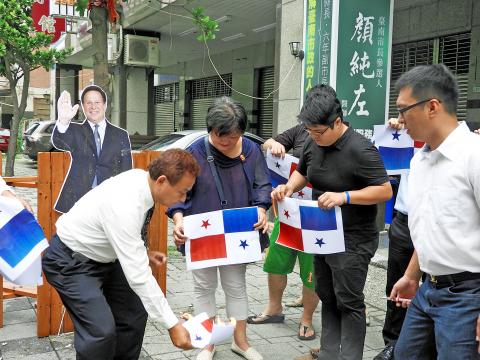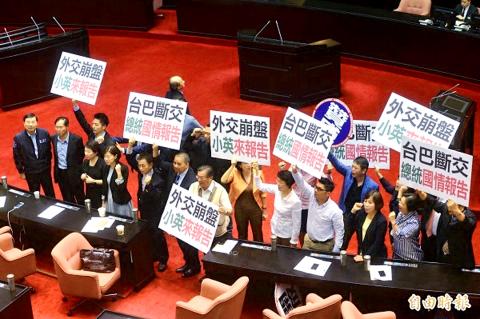Following Panama’s severing of ties with Taiwan in favor of Beijing on Tuesday, one country has asked Taiwanese representatives to leave within a week and five other countries or territories are under pressure from China to rename the Taiwanese representative offices they host, the Ministry of Foreign Affairs (MOFA) said yesterday.
One of the five, Dubai, yesterday officially changed the Taiwanese office’s title under pressure from Beijing, the ministry said, adding that two of the nation’s 20 diplomatic allies are “medium-risk countries” that might shift diplomatic recognition.
The nation’s representative office in Dubai was originally registered as “The Commercial Office of the Republic of China to Dubai,” but the name was changed to “The Commercial Office of Taipei” after tremendous pressure from China, the ministry said, adding that the terminology was in line with the majority of nation’s representative offices globally.

Photo: Chiu Hao-tang, Taipei Times
Among countries and territories with which Taiwan has no formal relations, six have allowed Taiwanese representative offices to use the name Republic of China (ROC), and one allows the use of the name “Taiwan.”
However, China has been pressuring five of those seven countries to rename the offices, Department of West Asian and African Affairs Director-General Chen Chun-shen (陳俊賢) told a news conference.
Beijing has been coercing Nigeria, Dubai, Jordan, Ecuador and Bahrain to force the offices to change their names, presumably into “Taipei Representative Office” or a name less suggestive of Taiwanese sovereignty, Chen said.

Photo: Wang Yi-sung, Taipei Times
The Nigerian government yesterday reportedly told the Taiwanese representative office to leave the capital, Abuja, within one week or it would not guarantee the safety of the mission’s staff.
MOFA confirmed that it received a notice on March 31 from the Nigerian Ministry of Foreign Affairs demanding that the government remove Representative Chao Chia-pao (趙家寶) from the country or it would not guarantee his safety.
The mission in Nigeria has been closed since April, and Chao has turned to Taiwan, but some representatives have remained in the country, Chen said.
Chen had summoned Nigeria’s envoy to Taiwan to protest the extremely unfriendly actions of the Nigerian government, the ministry said.
The government is observing the actions of the Nigerian government and will respond in kind to the Nigeria Trade Office in Taiwan, it said.
The ministry has been attempting to open a line of communication with the Nigerian government since January, when Nigerian Minister of Foreign Affairs Geoffrey Onyeama demanded that Taiwan relocate its representative office to Lagos, change its name and reduce its staff, it said.
Although the ministry is willing to find a solution acceptable to both sides, the Nigerian government had caved in to China’s bullying demands and refused to negotiate, it said.
The ministry deeply regrets the turn of events and will continue to negotiate with Nigeria on the basis of dignity and reciprocity, it said.
Among the nation’s 20 diplomatic allies, two have been marked “yellow,” suggesting a risk of diplomatic deterioration according to the ministry’s three-color indicator system, Chen said.
Chen refused to reveal which two countries they are to prevent any further Chinese intervention, adding that no countries are marked as “red.”
However, Panama was marked “green” when it decided to sever diplomatic ties with Taiwan, suggesting flaws in the ministry’s intelligence collection system, he said.
Democratic Progressive Party (DPP) lawmakers asked the ministry to reassess ties with diplomatic allies as if they were all marked “red,” because there is no sign of China easing pressure on Taiwan.
Meanwhile, President Tsai Ing-wen (蔡英文) said the nation would not cave in to pressure, despite Beijing’s relentless aggression.
“It is internationally understood that Beijing is unilaterally changing the ‘status quo’ in cross-strait relations. Its provocation does not only affect regional peace and stability, but has destroyed interactions between Taiwan and China,” Tsai said at the DPP’s Central Standing Committee meeting.
“Under such circumstances, we will re-evaluate the cross-strait situation and we will be firmer against pressure [from Beijing]. We will definitely not compromise under threat,” she said.
The national security team has done everything it could to ensure Taiwan’s survival in the international arena, but the nation refuses to make compromises on national dignity and sovereignty, she said.
Taiwan could solidify relations with other countries with its soft power and maintain its presence in the international realm, she said. “Although faced with Chinese pressure and unfavorable international conditions, Taiwan’s values and status in the international society will stay unchanged,” Tsai said.

CHAOS: Iranians took to the streets playing celebratory music after reports of Khamenei’s death on Saturday, while mourners also gathered in Tehran yesterday Iranian Supreme Leader Ayatollah Ali Khamenei was killed in a major attack on Iran launched by Israel and the US, throwing the future of the Islamic republic into doubt and raising the risk of regional instability. Iranian state television and the state-run IRNA news agency announced the 86-year-old’s death early yesterday. US President Donald Trump said it gave Iranians their “greatest chance” to “take back” their country. The announcements came after a joint US and Israeli aerial bombardment that targeted Iranian military and governmental sites. Trump said the “heavy and pinpoint bombing” would continue through the week or as long

TRUST: The KMT said it respected the US’ timing and considerations, and hoped it would continue to honor its commitments to helping Taiwan bolster its defenses and deterrence US President Donald Trump is delaying a multibillion-dollar arms sale to Taiwan to ensure his visit to Beijing is successful, a New York Times report said. The weapons sales package has stalled in the US Department of State, the report said, citing US officials it did not identify. The White House has told agencies not to push forward ahead of Trump’s meeting with Chinese President Xi Jinping (習近平), it said. The two last month held a phone call to discuss trade and geopolitical flashpoints ahead of the summit. Xi raised the Taiwan issue and urged the US to handle arms sales to

State-run CPC Corp, Taiwan (CPC, 台灣中油) yesterday said that it had confirmed on Saturday night with its liquefied natural gas (LNG) and crude oil suppliers that shipments are proceeding as scheduled and that domestic supplies remain unaffected. The CPC yesterday announced the gasoline and diesel prices will rise by NT$0.2 and NT$0.4 per liter, respectively, starting Monday, citing Middle East tensions and blizzards in the eastern United States. CPC also iterated it has been reducing the proportion of crude oil imports from the Middle East and diversifying its supply sources in the past few years in response to geopolitical risks, expanding

An Emirates flight from Dubai arrived at Taiwan Taoyuan International Airport yesterday afternoon, the first service of the airline since the US and Israel launched strikes against Iran on Saturday. Flight EK366 took off from the United Arab Emirates (UAE) at 3:51am yesterday and landed at 4:02pm before taxiing to the airport’s D6 gate at Terminal 2 at 4:08pm, data from the airport and FlightAware, a global flight tracking site, showed. Of the 501 passengers on the flight, 275 were Taiwanese, including 96 group tour travelers, the data showed. Tourism Administration Deputy Director-General Huang He-ting (黃荷婷) greeted Taiwanese passengers at the airport and